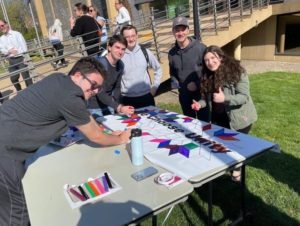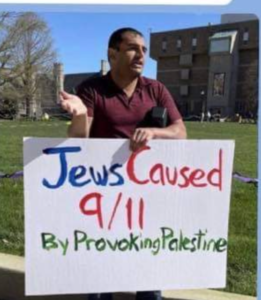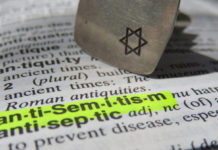
Incidents of antisemitism and anti-Zionism on West Chester University’s campus prompted Jewish students to speak out and request a greater response from the WCU administration when anti-Jewish incidents occur on campus.
On April 15, a man with signs reading “Jews Caused 9/11 by Provoking Palestine” and “Jews Reject Jesus Christ, You Know What You Did” walked around WCU’s campus and neighboring streets. He has been doing so for several days.
On April 29, the school’s Department of English journalism program and Peace and Conflict Studies program hosted Palestinian writer Mohammed El-Kurd, who has previously tweeted anti-Israel statements such as, “Across the country Zionists are beating, gassing, shooting, lynching Palestinians. … State-settler collusion emboldening an unquenchable thirst for Palestinian blood & land. Terrorist, genocidal nation.” The Anti-Defamation League page on El-Kurd describes him as having a “troubling pattern of rhetoric and slander that ranges far beyond reasoned criticism of Israel.”
The WCU Office for Diversity, Equity, and Inclusion issued an email response on April 24 suggesting students avoid the demonstrator on campus but did not specifically mention the antisemitic nature of his signs.
“We heard from a significant number of students that the demonstrator on the quad made them feel uncomfortable and the university’s response even more so,” said Rabbi Jeremy Winaker, executive director at Greater Philly Hillel Network, which oversees WCU’s Hillel. “And then we had a range of responses to the upcoming speaker, all of which expressed concern again, for their safety on campus.”
The events on WCU’s campus happened at the same time as the discovery of at least a dozen antisemitic flyers found on Ardmore lawns. The flyers, first spotted on Rock Glen Road and Saint Georges Road on April 22, contained a link to an antisemitic website. An investigation of who distributed the flyers is ongoing, and the Lower Merion Police Department have made no arrests.

WCU Hillel, in light of the recent antisemitic demonstrator and before El-Kurd’s speaking engagement, posted a statement on its Instagram asking the school administration to “call out antisemitic activity as antisemitic or, at least, hate speech when it happens on campus.”
WCU President Chris Fiorentino released another email statement on April 26 that addressed the demonstrator and antisemitism explicitly, but admitted that little action could be taken, as the demonstrator was not breaking a law.
“We can’t stop the gentleman from coming to our campus because we’re a public university,” Chief Diversity and Inclusion Officer Tracey Robinson said. “So we’ve talked about our efforts to try to not give hate an audience. That’s why we send out our message to let people know that there’s an uninvited guest in the quad and, if they can, to avoid that area or not engage. We also provide them with strategies for using their voice in ways that counter the message that’s being sent.”
WCU students also met with Leah Tobin, vice president of religious affairs; Zebulun Davenport, vice president of student affairs; and Robinson about the El-Kurd event, bringing up concerns about that his anti-Israel rhetoric.
“We weren’t there to discuss necessarily the Israeli-Palestinian conflict,” WCU Hillel student President Madelyn Chartock said. “We were more there to address the fact that he makes comments about Zionism, Israeli Jews and Jews in general.”
The school’s English department decided to continue to host the event, reiterating, “It is important to hear about Mohammed El-Kurd’s human rights journalism in its full context,” Ben Kuebrich, associate professor of English, said of the event.
Ryan Levinson, a Jewish junior not affiliated with Hillel, handed out flyers before the event to express his concerns and disappointment in the administration for not condemning the event.
“Instead of being vague, like they have in the past, just saying ‘antisemitism,’ [the school] needs to call out the speaker and warn students because … this isn’t a controversial, radical speaker,” Levinson said. “This is someone that’s spewing lies.”
Hillel, along with the Student Leadership and Involvement office, hosted a unity event at the same time as El-Kurd’s presentation. The students painted a banner that said, “We choose unity.”
El-Kurd’s event, however, didn’t necessarily warrant the overwhelming student response, according to Hillel member Matt Honig, who attended the event along with 40-50 other students.
“A majority of the students, myself included, completely blew the speaker ‘s intentions out of proportion,” Honig said.
El-Kurd, who Honig described as a “soft-spoken, well-mannered guy,” shied away from anti-Israel sentiments, Honig said, and instead read from his poetry book “Rifqa” and spoke about his family’s own experiences living in East Jerusalem.
The debate over the speaker is part of a greater conversation within the WCU Jewish community about how to talk about the Israeli-Palestinian conflict. The first step, according to Winaker, is to ensure Jewish students feel seen and heard by school leadership, so they feel comfortable exploring their Jewish identities and relationship with Israel.
“College is a unique time and life when [students] can engage with difficult ideas, and they should,” Winaker said. “But they need to feel safe in order to do so meaningfully.”






